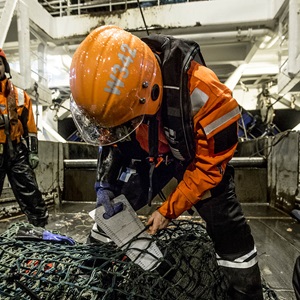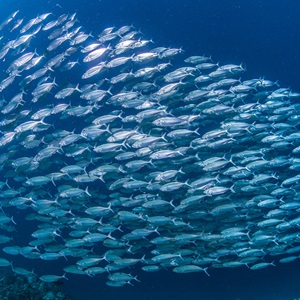When fisheries are assessed against the MSC Fisheries Standard, the assessments are reviewed by independent experts. These experts are nominated by the MSC Peer Review College. The process ensures fisheries assessments are credible and consistent with our Standard requirements.
Who are the peer reviewers?
The MSC Peer Review College has contracts with approximately 120 independent fisheries experts, who specialise in subjects including fish stock assessments and ecology, fishing impacts on aquatic ecosystems, and fisheries management.Each reviewer must meet specific selection criteria, including at least three years’ experience in fisheries management or research. They are also required to complete training modules on the MSC Fisheries Standard and assessment process.
The peer review process
The College produces a shortlist of peer reviewers, based on their expertise and knowledge of the type of fishery being assessed. Shortlists are verified by two third-party experts and stakeholders engaged in the fisheries assessment process are consulted to ensure that none of the candidates have any conflicts of interest.
Typically, two peer reviewers are appointed to review assessment reports from fisheries that are being assessed for the first time. Reassessments may only require one peer reviewer, if specific criteria are met.
There are two stages in each fisheries assessment that involve input from peer reviewers:
- An initial review of the draft scores awarded by the Conformity Assessment Body (CAB) following a fishery site visit.
- A ‘follow-up’ review following publication of the Public Comment Draft Report, where the peer reviewer checks the CAB responses to their initial comments. Further comments can be submitted if the reviewer feels the initial comments were not adequately addressed.
Reviewers must record all comments in a template, which clearly identifies suggested score changes or if the information provided by the fishery is not adequate. The CAB must also use the template to respond in full to every comment made. All comments and the CAB’s responses are published in the assessment reports, which are publicly available on Track a Fishery.
Further details of the peer review stages can be found in the Structures and Procedures document.Oversight and assurance
To maintain its impartiality and independence, the Peer Review College has an oversight committee appointed by the MSC Board of Trustees. The committee comprises members of two of the MSC’s governance bodies, the Stakeholder Advisory Council and Technical Advisory Board.
Further details of the oversight committee and governance procedures can be found in the Structures and Procedures document.
Two third-party experts are also used to verify the peer review candidates for each fishery assessment and provide quality assurance on selected reviews. This aims to ensure that reviews are consistent with the MSC Standard and of a high quality, and helps identify areas where further training may be needed.
Expand the drop down menus below to view the current members of the oversight committee and third-party experts involved in the peer review process.
General Director, Comunidad y Biodiversidad, A. C. Mexico. Expert on fisheries management, and governance; mainly with data-limited and small-scale fisheries in Latin America and the Caribbean.
Mr Jose Augusto Pinto de Abreu
Managing Director of Sextante Consultoria, expert on management systems, standardization and regulation, conformity assessment, risk management, and sustainability.
Dr Victor Restrepo
Chair, Scientific Advisory Committee, and Vice-President for Science, International Seafood Sustainability Foundation (ISSF). Expert in large pelagic fisheries and Regional Fisheries Management Organisations, and in peer review processes, such as used by the USA Center of Independent Experts (CIE).
Dr George Rose
Honorary Professor at the Institute for the Oceans and Fisheries, University of British Columbia (retired). Expert on fisheries science, peer reviewing and publishing.
Ms Mod Talawat
Programme Management Specialist (National Coordinator, Thailand, for ‘Implementing the Strategic Action Programme for the South China Sea and Gulf of Thailand’ Project). United Nations Office for Project Services. Expert on coastal zone management, FIP implementation, and fisheries management.
Dr Rob Blyth-Skyrme
Independent consultant and expert in fisheries science, management and policy, having worked previously as a researcher, Government advisor and Deputy Chief Fishery Officer in the UK. Extensive MSC assessment experience, and a trainer for the MSC’s Capacity Building programme.
Dr Gudrun Gaudian
Independent consultant with extensive MSC assessment experience. Expert in marine ecology, fisheries science and management, and environmental law and policy.
Mr Tom Jagielo
Independent consultant, previously chair of the Scientific and Statistical Committee of the Pacific Fishery Management Council and of the US/Canada Groundfish Technical Subcommittee. Expert on quantitative analysis and fisheries population dynamics, with extensive MSC assessment experience.
Dr Kevin Stokes
Independent consultant, having worked at senior levels in UK government and New Zealand industry. Current chair of the Scientific Committee of the Commission for the Conservation of Southern Bluefin Tuna (CCSBT). Expert in fisheries science and management with extensive MSC assessment experience.
Persistent disagreements
In some cases, peer reviewers raise comments that the CAB does not accept. If these points are raised and rejected in both the initial and follow-up reviews, the issue is recognised as a ‘persistent disagreement’.Persistent disagreements may change the outcome of the assessment. An example of this would be a dispute over whether a score meets the minimum pass level for certification.
In July 2022, the Peer Review College introduced a new procedure where such critical persistent disagreement cases are checked by one of the third-party experts. If they decide the CAB responses are not adequate, details are sent to ASI to investigate. Feedback is also provided to any peer reviewers whose comments are seen as inconsistent with the MSC Standard.
Between July 2022 and October 2024, the third-party experts reviewed persistent disagreements from 16 reviews. This led to ASI incidents being raised for the CABs in six cases and corrective feedback sent to the peer reviewers in seven cases. Outcomes were changed by the CABs from pass to fail in two of these cases (results are still awaited in two cases).
Contact us
For further information or to apply to join the College as a peer reviewer, please email the team (Dr Dan Hoggarth and Nikki Samuel) via [email protected].Find out more

Engage with a fishery assessment
Find out more about the different stages of a fishery assessment and how to participate.

The MSC Fisheries Standard
The MSC Fisheries Standard is used to assess if a fishery is well-managed and sustainable.

How we meet best practice
Find out about our assurance system, which ensures the assessment process is working.

